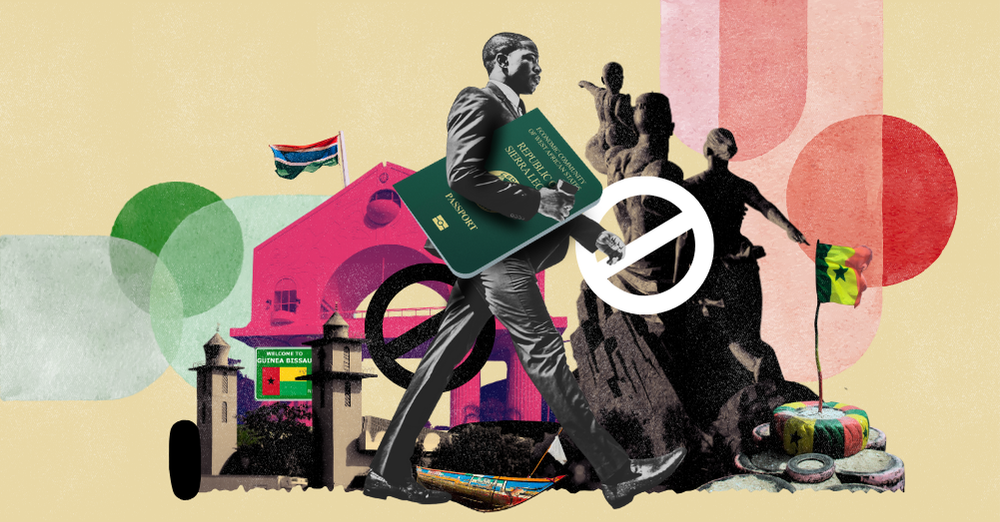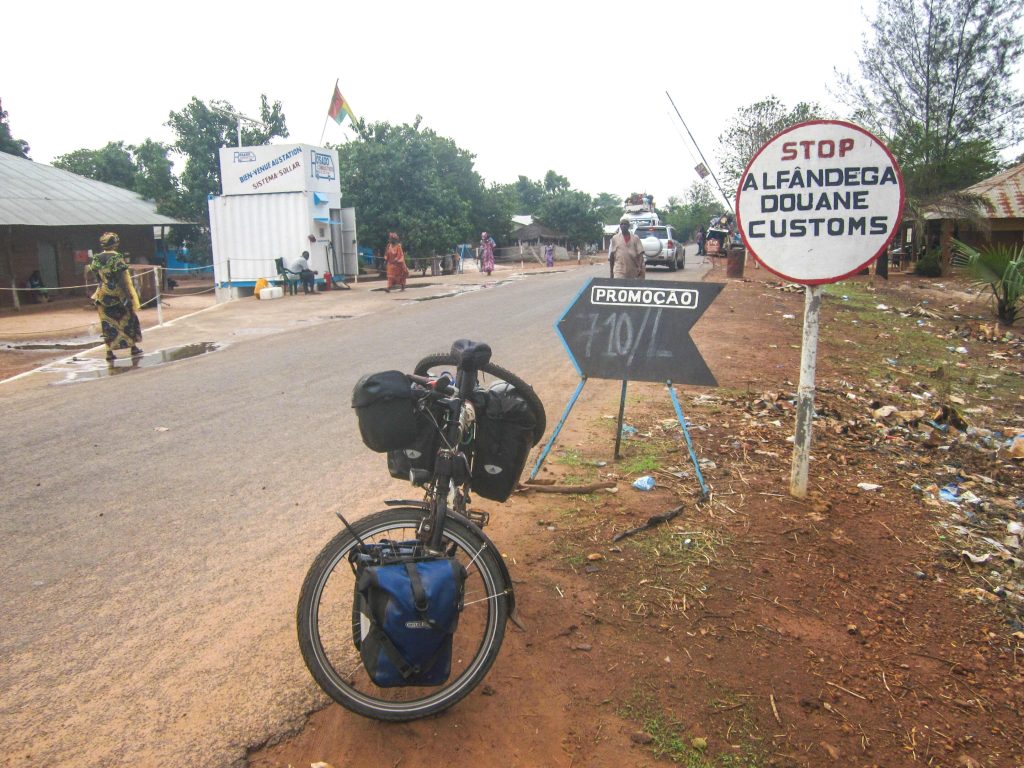
Photo illustration by Dami Mojid / THE REPUBLIC.
THE MINISTRY OF WORLD AFFAIRS
The Hidden Cost of Travelling Around West Africa

Photo illustration by Dami Mojid / THE REPUBLIC.
THE MINISTRY OF WORLD AFFAIRS
The Hidden Cost of Travelling Around West Africa
As a West African researcher working on the region, I have spent years conducting research mostly in Sierra Leone and Liberia—two countries I know very well. But a 2024 field trip offered a rare and firsthand experience of the daily struggles of ordinary West Africans crossing colonially inherited borders, challenging everything I thought I knew about freedom of movement within West Africa. As other instruments promoting economic integration and seamless movement of people such as that of the European Union, the Economic Community of West African States’ (ECOWAS) treaty promises an attractive idea: free movement of persons, goods and services across member states. This vision of a borderless West Africa, brimming with trade and collaboration, was one I thought truly existed. But it doesn’t.
On 21 April 2024, I departed the United Kingdom for West Africa with a European colleague, for a four-week field trip. The first stop was Guinea Bissau, where we arrived by air in the early hours of 22 April, in time for the start of a three-day forum that brought together key stakeholders in the region’s coastal and marine conservation landscape. On the back of a successful forum revealing insightful ideas and initiatives, as well as providing immense networking opportunities, we set out again on a journey that took us by road from Guinea Bissau, through Senegal to the Gambia. We were both armed with our passports, full of optimism for a smooth journey. In addition, as a Sierra Leonean citizen, I had my ECOWAS identification card—a document my government has suggested is useful for seamless travel across West Africa. The optimism, however, eroded rapidly at each border crossing.

THE ‘TRAVELLER’S TAX’
At every border—Guinea Bissau to Senegal and Senegal to The Gambia—the script unfolded with a disturbing consistency. While my European colleague and another French lady were ushered through the meandering queues with minimal checks and allowed to proceed without being asked for bribes, except for one border point, I was constantly pulled aside and asked for money, with a warning that my documents would only be released on a bribe. Each time I refused, claiming my right to free movement in the region, with our driver offering instead to pay the bribe to avoid delays. As one immigration officer flickered between my passport and ECOWAS ID, the answer, it seemed, was not on either document. The ‘traveller’s tax’, as I light-heartedly tried to frame it, was the price of passage—a stark violation of the ECOWAS idea. Using a mix of English and French, the officer demanded: ‘You have to pay mille francs CFA’, that is, 1,000 of the currency used by countries in the African Financial Community (approximately US$1.6), which is pegged to the euro. Despite my protestation and suggestion of filing a complaint against officials of the border post, another remarked in broken English, ‘We in-charge here, not government in Dakar’, illustrating the accountability gap between officials in West Africa’s capitals and those in far-flung border posts, resulting in ‘decentralized’ forms of petty corruption.
Clearly, I was subjected to a stark and undeniably two-tiered system, where it appeared the colour of one’s passport, or perhaps the perceived economic leverage it carries, dictates the level of respect and adherence to international protocols. It was a bitter pill to swallow. As a West African seeking to move freely within my own region, I was subjected to extortion, while non-Africans enjoyed the very freedom that should inherently be ours.
As I arrived in Banjul, Gambia, I reflected on the challenges facing ordinary West Africans, as well as the calculations informing immigration officials’ decision to let my colleague and the French lady in without hindrance, while I struggled at each border crossing. Was it a reflection of ‘colonially inherited’ inferiority complex, mirroring the enduring impact of colonialism’s legacy on the psyche of some in the region? Or was it based on the rationality that I was my colleague’s gatekeeper—as such, my ‘traveller’s tax’ would have covered hers as well? Unfortunately, I will not know the answers to these questions anytime soon, as I have decided never again to travel across land borders.
shop the republic
BEYOND THE PERSONAL: TRADE, TOURISM, TRUST AND THE ROAD AHEAD
My experience wasn’t just a personal challenge. In fact, while at each border crossing where I negotiated the release of my documents, several West African citizens also queued to pay the ‘traveller’s tax’, which perhaps explained the anger of the immigration officials towards me. My experience, and those that go through the region’s borders each day, lay bare the cracks in the ECOWAS dream. If a researcher with relative privilege and proper documentation faces such challenges, imagine the predicament of ordinary West Africans trying to trade goods, visit family or pursue opportunities across borders. The implications extend far beyond petty bribery. It discourages legitimate trade, stifles entrepreneurship and deters tourism. More importantly, it erodes trust in the very institutions such as ECOWAS that are meant to foster regional integration.
My experience is just one among many stories, amplifying a much bigger issue. As West Africans, we deserve better. We deserve a fairer system that supports the free movement of people enshrined in the ECOWAS treaty. This means there is a lot of work to be done, including strengthening border management systems, promoting transparency and accountability within immigration services, raising awareness about the ECOWAS protocols and prioritizing ECOWAS citizens’ right of movement. My journey wasn’t just about reaching a research destination; it was also a reminder of the work that lies ahead for the governments and citizens of the region. Whereas West Africa’s land borders are difficult to cross, dismantling the barriers of corruption and prejudice that impede true regional integration pose an even greater challenge.
shop the republic
BEYOND ECOWAS AND IMPLICATIONS FOR THE AFRICAN CONTINENTAL FREE TRADE AREA
My personal experience, unfortunately, is not an isolated incident but a small-scale version of a much larger and systemic problem that plagues free movement across the African continent. While regional blocs such as ECOWAS, the East African Community (EAC) and Southern African Development Community (SADC) have championed protocols for free movement, their implementation remains severely hampered by a myriad of challenges, including corruption and extortion, lack of awareness and training, national security concerns (real or perceived), protectionism and local interests, infrastructure deficits, political will and implementation gaps. The implications of these challenges for Africa’s economy are profound and detrimental, hindering trade and economic growth, limiting labour mobility, reducing regional integration and investment, undermining tourism, and cultural exchange, as well as increasing transactional costs.
In this context, the African Continental Free Trade Area (AfCFTA) has emerged as an inspiration and a truly transformative agreement that promises to usher in a new era of economic growth and prosperity for the continent. With 55 African Union member states, the AfCFTA aims to ‘create a single continental market with a population of about 1.3 billion people and a combined GDP of approximately US$ 3.4 trillion.’ Its promises are immense, including boosting intra-African trade by eliminating or significantly reducing tariffs on goods and reducing non-tariff barriers. This will foster regional supply chains and reduce reliance on external markets. The AfCFTA also aims to drive industrialization and value addition by creating a larger, unified market where African businesses will have greater incentives to invest in manufacturing and processing. Additionally, it holds the potential to create jobs, help African economies move up the global value chain and attract investment to a larger, more predictable market that will make Africa a more attractive destination for both foreign direct investment (FDI) and domestic investment. Ultimately, it unlocks new opportunities for growth across the continent.
shop the republic
-
‘The Empire Hacks Back’ by Olalekan Jeyifous by Olalekan Jeyifous
₦70,000.00 – ₦75,000.00Price range: ₦70,000.00 through ₦75,000.00 This product has multiple variants. The options may be chosen on the product page -
‘Make the World Burn Again’ by Edel Rodriguez by Edel Rodriguez
₦70,000.00 – ₦75,000.00Price range: ₦70,000.00 through ₦75,000.00 This product has multiple variants. The options may be chosen on the product page -
‘Nigerian Theatre’ Print by Shalom Ojo
₦150,000.00 -
‘Natural Synthesis’ Print by Diana Ejaita
₦70,000.00 – ₦75,000.00Price range: ₦70,000.00 through ₦75,000.00 This product has multiple variants. The options may be chosen on the product page
shop the republic
However, the success of AfCFTA is inextricably linked to the effective implementation of free movement protocols. As my experience travelling in West Africa illustrates, a free trade area cannot truly thrive if its citizens and their goods face arbitrary barriers at every turn. The promise of AfCFTA will remain just a pipe dream unless governments tackle the foregoing challenges, including corrupt and inefficient border management head-on. This requires robust enforcement of free movement protocols, combating corruption decisively, public awareness campaign, capacity building and training and harmonization of policies and regulations.
My disturbing experience traveling in West Africa, while personally frustrating, served as a powerful reminder of the urgent need for action. The dream of a truly integrated, prosperous Africa, one where its citizens can move freely and contribute to its collective growth, is possible. But it requires a collective commitment to dismantle the invisible barriers that continue to hold us back, ensuring that the promise of free movement and the potential of AfCFTA are not just aspirations, but lived realities for every African⎈
BUY THE MAGAZINE AND/OR THE COVER
-
‘Make the World Burn Again’ by Edel Rodriguez by Edel Rodriguez
₦70,000.00 – ₦75,000.00Price range: ₦70,000.00 through ₦75,000.00 This product has multiple variants. The options may be chosen on the product page -
The Republic V9, N2 Who Dey Fear Donald Trump? / Africa In The Era Of Multipolarity
₦40,000.00
















